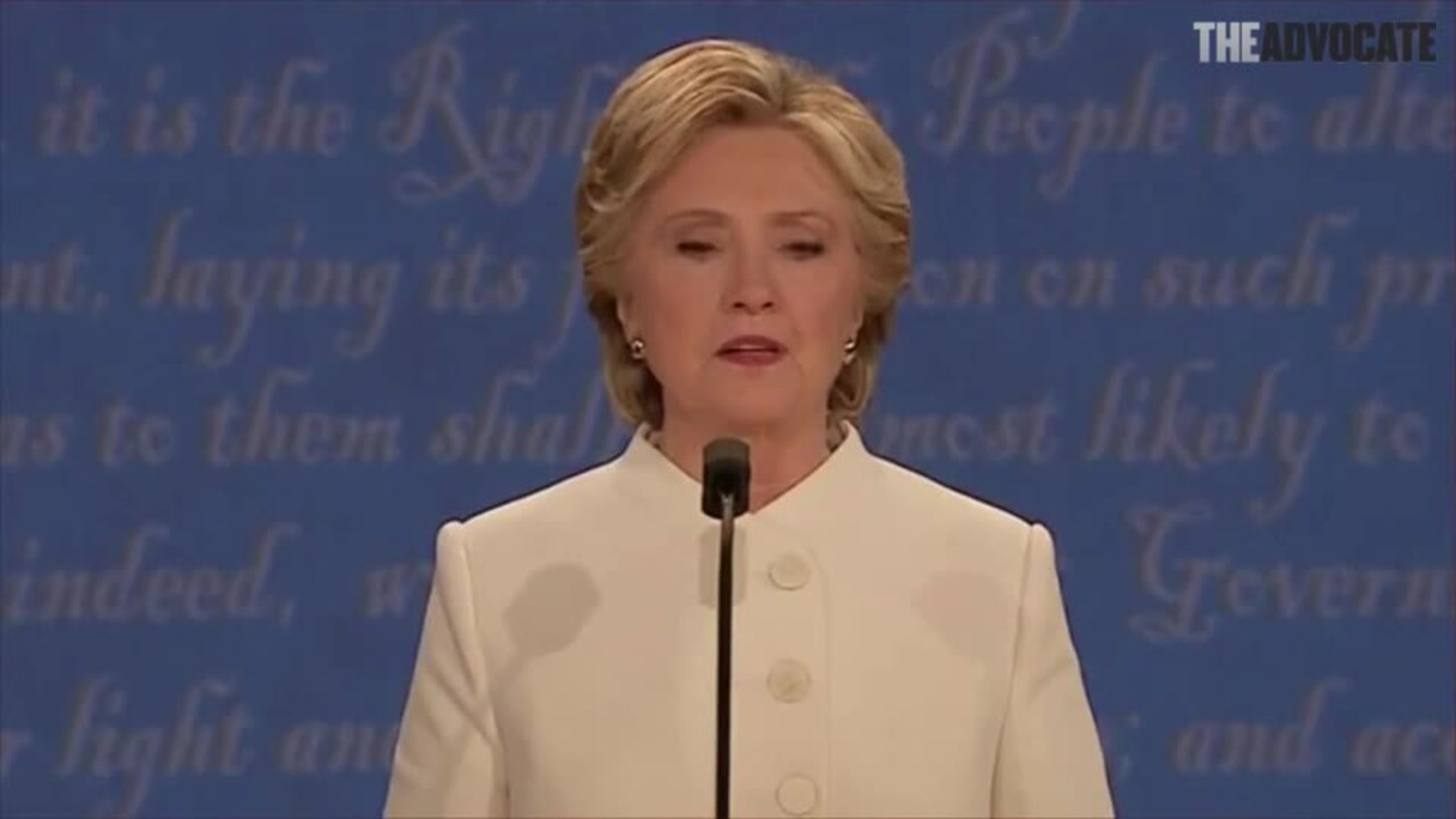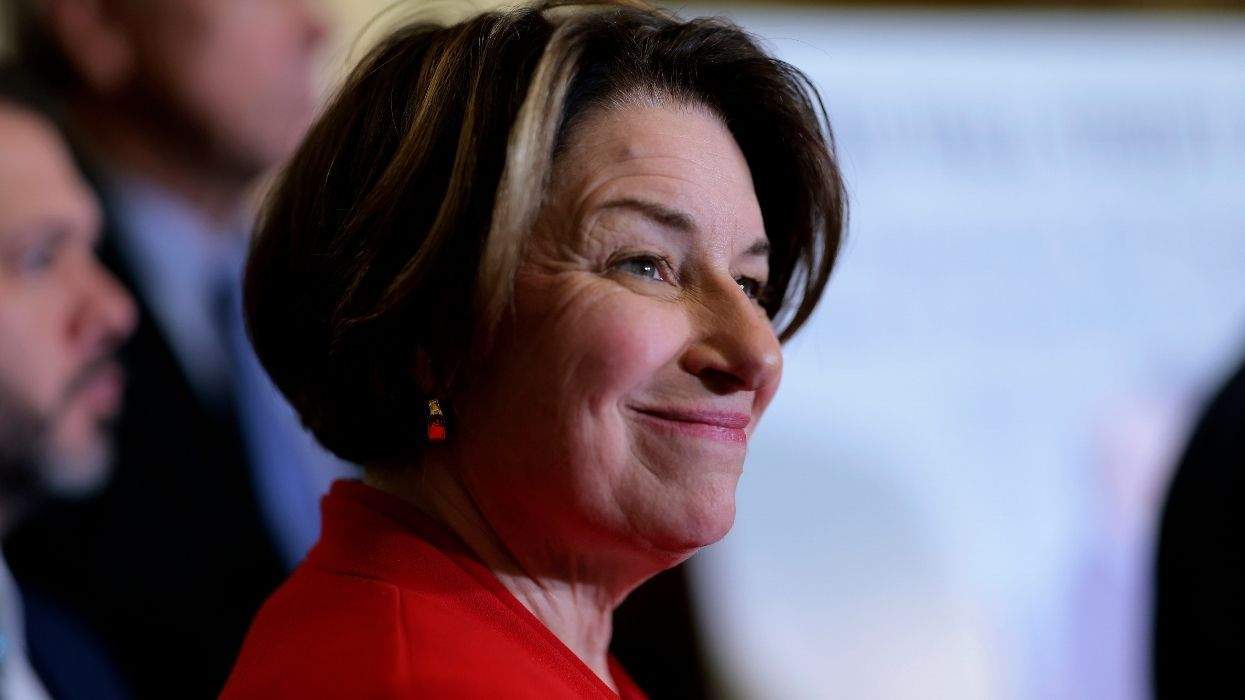It was a move without precedent: In Wednesday night's presidential debate, Republican nominee Donald Trump refused to say if he'll accept the results of November's election.
"I will tell you at the time," Trump told moderator Chris Wallace. "I will keep you in suspense." The candidate's support has been declining seriously in the wake of sexual assault allegations against him, but he has been saying for several days that the election is "rigged" against him, by a mix of media bias, voter fraud, and possibly misdeeds by Hillary Clinton's campaign.
"That is horrifying," Clinton responded. "You know, every time Donald thinks things are not going in his direction, he claims whatever it is is rigged against him." When he had his reality TV show, The Apprentice, he even claimed the Emmy Awards were rigged," she said.
The debate was also marked by numerous insults, mostly from Trump, saying at one point that his opponent is "such a nasty woman" and that her campaign has incited violence at his rallies (this coming from a video from a conservative group) and may be behind the sexual assault accusations. And when, at one point, he said Russian President Vladimir Putin has no respect for former Secretary of State Clinton or President Barack Obama, Clinton said, "That's because he'd rather have a puppet as president of the United States." Trump responded, "You're the puppet."
He also said Clinton should be disqualified from running for office because of her handling of emails while at the State Department, saying she had committed a criminal act, even though the FBI found no evidence of this.
There were several other big takeaways from the candidates' third and final debate, held at the University of Nevada, Las Vegas. Wallace's first question was about Supreme Court appointments, and Clinton went to LGBT rights almost immediately.
"I feel strongly that the Supreme Court needs to stand on the side of the American people, not on the side of the powerful corporations and the wealthy," said the Democratic nominee. "For me, that means that we need a Supreme Court that will stand up on behalf of women's rights, on behalf of the rights of the LGBT community, that will stand up and say no to Citizens United [a ruling that lifted some restrictions on campaign spending]. ... I feel that at this point in our country's history, it is important that we not reverse marriage equality, that we not reverse Roe v. Wade, that we stand up against Citizens United, we stand up for the rights of people in the workplace, that we stand up and basically say, the Supreme Court should represent all of us."
Trump didn't discuss LGBT rights in the context of the Supreme Court, but he said, "The justices that I'm going to appoint will be pro-life. They will have a conservative bent. They will be protecting the Second Amendment." He also criticized Justice Ruth Bader Ginsburg for criticizing him.
Clinton, for her part, said she's not against the Second Amendment, which protects the right to keep and bear arms, but she believes certain restrictions on gun ownership, such as expanded background checks for buyers, are not in conflict with it. And on abortion, she denounced a comment Trump once made about punishing women who have abortions, something he had to walk back quickly.
When Wallace asked Trump if he wanted to see Roe v. Wade, the 1973 abortion rights decision, overturned, he didn't give a straight answer but said he'd like to see abortion go back to being a state-by-state issue, which is exactly what an overturning of Roe v. Wade would bring about.
Moving on to immigration, Trump accused Clinton of wanting amnesty for undocumented immigrants (which she does not), while she said she supports border security along with a path to citizenship for certain undocumented people, especially to keep families together. "What I am also arguing is that bringing undocumented immigrants out from the shadows, putting them into the formal economy will be good, because then employers can't exploit them and undercut Americans' wages," she said. Trump, she said, exploited undocumented immigrants in building his Trump Tower in New York City. Trump has previously denied he knew the workers were in the country illegally, but there are published reports that indicate he did. And he made a comment about Latino immigrants that immediately post-debate is being seen as racist, saying the U.S. has to keep out "bad hombres."
There was also much back-and-forth about each candidate's economic plans, with Clinton decrying Trump's proposal for deep tax cuts (which he said will stimulate job creation), and him denouncing hers as one that would "double" people's taxes (not true). She got in a dig about him for not paying federal income taxes in one and possibly more years, and he contended that Clinton's major donors have taken advantage of similar loopholes (at least one, Warren Buffett, has said he does not), and that Clinton, when she was a U.S. senator from New York, should have changed the laws so he couldn't do so. It would, of course, take more than one senator to do that.
Other major moments: Clinton defended the work done by the foundation she established with her husband, former President Bill Clinton, especially in providing lifesaving HIV drugs in developing countries. Trump criticized the foundation for taking funds from countries such as Saudi Arabia, where women and LGBT people are oppressed, and she criticized some activities of the Trump Foundation, such as using its funds to settle lawsuits and buy a huge portrait of Trump.
Trump contended the women who have accused him of sexual assault are either motivated by a desire for fame or were put up to it by the Clinton campaign, and when Clinton said he had tried to dismiss the women's claims by saying their were unattractive, he denied saying that -- although he has been captured on video doing just that. He also denied ever making fun of a journalist's disability, although that is on video as well. He noted that Bill Clinton has also been accused of assaulting women; Hillary Clinton did not respond to that.
There was much more, including exchanges over whether the U.S. should admit refugees from war-torn Syria, who would be better at fighting the terrorist group ISIS in the Middle East, and how to handle terrorism generally, with Clinton noting that some terrorists are home-grown -- Omar Mateen, the shooter at the Pulse gay nightclub in Orlando, was born in Queens, N.Y., just as Trump was.
Trump made headlines before the debate by inviting President Obama's estranged half-brother to attend, along with some people who blame Clinton for the attack on the U.S. mission at Benghazi, Libya. But these subjects didn't come up.
For more information, see The Washington Post's transcript, with fact-checking, here, and National Public Radio's transcript, also fact-checked, here.
















